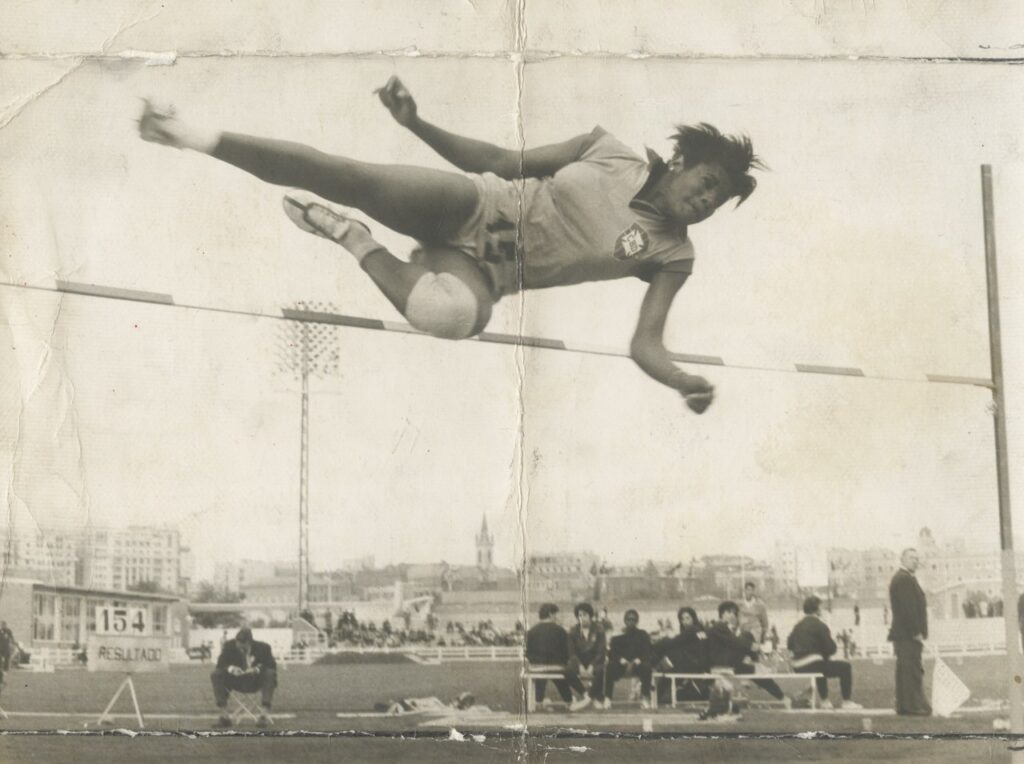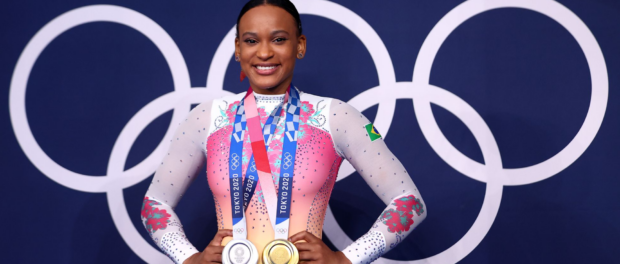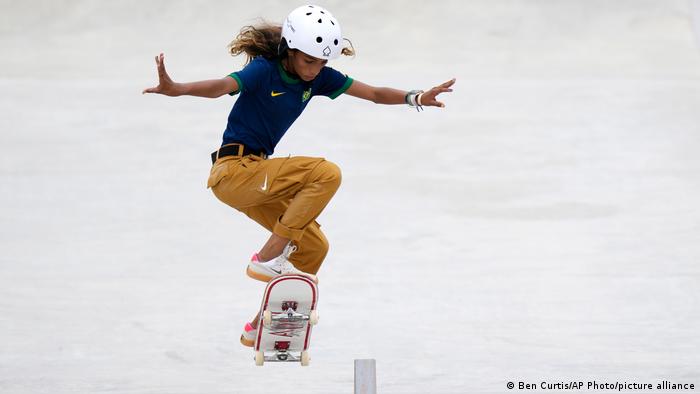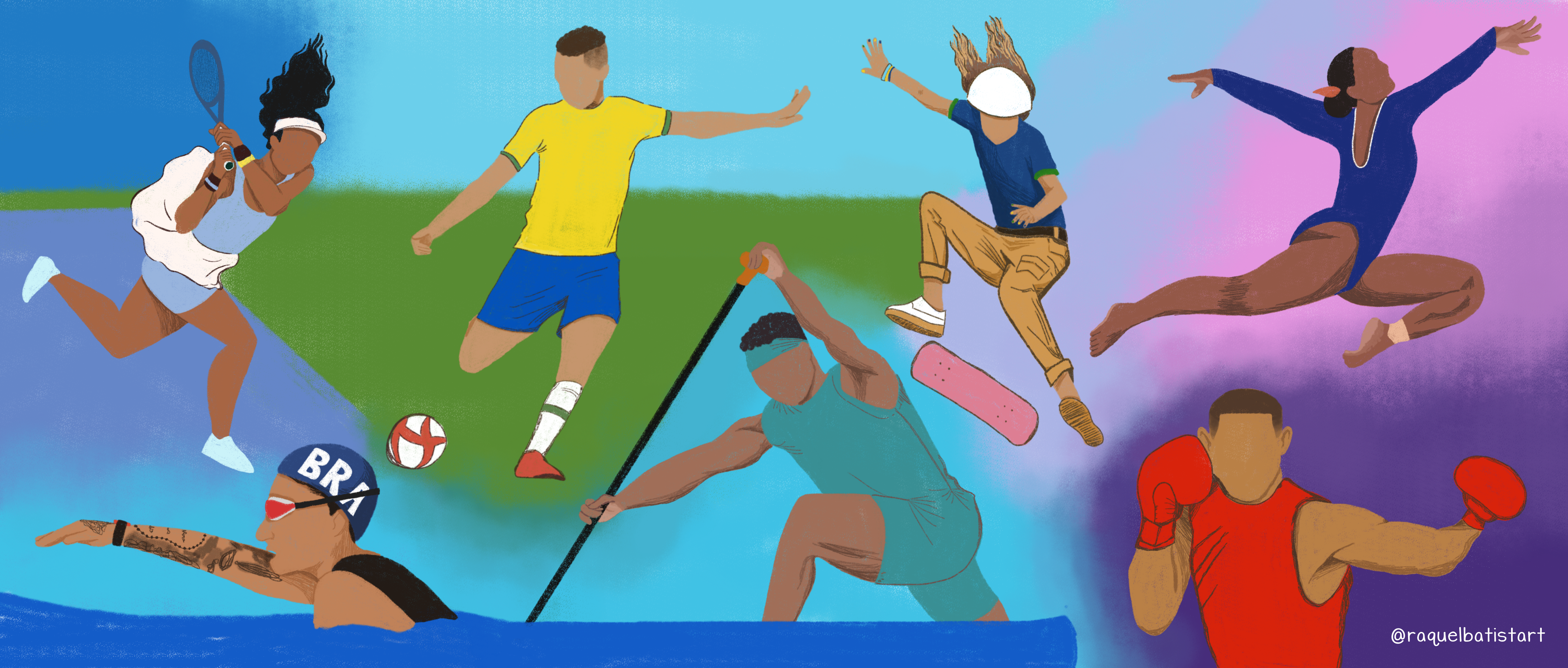
This article is part of RioOnWatch’s #VoicesFromSocialMedia series, which compiles perspectives posted on social media by favela residents and activists about events and societal themes that arise. It is also the latest contribution to our year-long reporting project, “Rooting Anti-Racism in the Favelas: Deconstructing Social Narratives About Racism in Rio de Janeiro.” Follow our Rooting Anti-Racism in the Favelas series here.
When the name of a black athlete from Brazil enters the history books of the Olympic Games, it is an achievement that was built by overcoming many hurdles, by surmounting the many obstacles that lie along the way.
1964 was the first time that Tokyo, Japan, hosted the Olympic Games. At that time, the Brazilian delegation had 68 athletes. Aída dos Santos, then 27, was the only woman in the group. A black woman, Aída never received the appropriate support. At home, she was discredited by her parents who asked if track and field put food on the table.
On the track, the trainer gave her some support. But the managers treated her differently. She arrived in Japan without adequate clothing, without technical support, without an interpreter and without her name being registered for the events. She had to depend on the support of athletes from Cuba and Peru just to get hold of sneakers to compete. When she needed a doctor, it was the empathy of the Cuban athletes that resolved the issue. And yet, dos Santos jumped over the entire racist structure and came fourth in the high jump, the best result for a Brazilian woman until the 1996 Olympics, in Atlanta, in the US.
The athlete who made history in Tokyo, as Brazil was entering the bleak years of the military dictatorship, reveals much more than the legacy of an Olympic record. Dos Santos lays bare the neglect, fruit of racism, of those who direct investments into the various Olympic disciplines practiced in Brazil. In a recent interview given to news portal UOL, dos Santos said, “Athletics is still the poor cousin among our national sports, so imagine what it was like back then. Me, a woman, poor, and black.”
Unfortunately, dos Santos’ story still echoes in the lives of the black women and men who decide to follow this path. But the capacity for resistance and resilience makes this daily struggle not always end predictably.
Almost 60 years separate Aída dos Santos from Rebeca Andrade. But the lack of resources, the thought of giving up, and the exclusion felt by Brazil’s peripheral population remain the same. This time, however, the favela reached the highest spot on the podium. In the same country that acclaimed dos Santos, Andrade wrote another chapter of history being the first Afro-Brazilian woman to win a medal in an Olympic individual gymnastics category.
Every time we witness the achievement of a black person, we can be sure that this result is the sum of collective efforts and many confrontations with a racist system. Andrade was born and raised in the periphery of Guarulhos, in São Paulo. From a young age she saw her mother, a domestic worker, give her all to provide for eight children in a house with one room. She often lacked money to pay for the bus ride to get to practice. And all of this before she turned ten.
To give more weight to this achievement, the presentation that earned her the silver medal took oft-criminalized Brazilian funk music, with the track Baile de Favela (Favela Party) by MC João, into a sporting category marked by white dominance. Andrade’s gold medal came during the vault event. The MC thanked her on his Instagram page:
Ver essa foto no Instagram
And Rebeca Andrade is baile de favela…
Congratulations for the victory, what energy
Amazing, and once again, thanks so much for choosing my music to be a part of such a beautiful story
Shine on, Champion
Marcelle Decothe, from Favelas na Luta (Favelas in the Struggle) and coordinator of the Marielle Franco Institute, used social media to highlight the achievement’s importance:
Invistam no esporte.
Invistam na educação.
Acreditem na próxima geração de Rebecca’s.
Acreditem nas crianças negras.Vai ser pelo funk, vai ser pelo esporte, vai ser pela educação.
Vai ser por noiz!
— Marcelle #TemGenteComFome (@marcelledecothe) July 29, 2021
Invest in sports.
Invest in education.
Believe in the next generation of Rebecas.
Believe in black children.
It’s going to be for funk, for sports, for education.
It’s going to be for us!
This achievement, which goes well beyond representation, saw one of the most touching moments of the 2020 Olympic Games in the testimony of former gymnastics superstar Daiane dos Santos, also Afro-Brazilian. During a live broadcast, the former gymnast highlighted the fact that a black woman was the first to be reaching this point. The Instagram page Influência Negra (Black Influence) posted the video with Daiane’s comments on SporTV:
Ver essa foto no Instagram
@daiane_gs_ is touched and touches us with her words. We’re immensely proud of you, of what you represent and will continue to represent for other black women who will follow
“For a long time people said that you couldn’t have black gymnasts, that black people couldn’t do certain sports. And today we see the first medal for a black girl. There is a lot of representativeness behind this.”
Video Reproduction: TV Globo/SporTV
#BlackInfluence #BlackWomen #Representation #Olympics
What has become more evident every day, all over the world, is athletes breaking the silence in relation to the racism they face every step of the way. In an interview for Marie Claire magazine, Daiane dos Santos revealed that she suffered racist attacks in clubs and within the Brazilian delegation, to the point that people wouldn’t use the same bathroom as her on account of her skin color and origin.
When an illustration of Afro-Brazilian skateboarder Rayssa Leal presented her as light-skinned, social media did not stay silent for long and criticism soon rained down. The athlete nailed a maneuver that most of the competitors got wrong and became the youngest Brazilian athlete to take the Olympic podium (at age 13). She was also the first medalist of the year in which the sport was first included in the Games. Black designer and illustrator @dapenha posted a thread to question the illustration:
Aconteceu o imaginado: acabei de ver uma arte de um branco que botou tanta *LUZ* na ilustração que fez que a menina Rayssa Leal nem parece negra nela.
— DAPENHA (@dapenhaaqui) July 26, 2021
Embranquecimento é coisa séria e apagar uma parte tão importante da identidade alguém numa ilustração por likes não é uma coisa aceitável.
— DAPENHA (@dapenhaaqui) July 26, 2021
Original Tweet: The imagined has happened: I’ve just seen some art done by a white person who put so much *LIGHT* in the drawing that it made the girl Rayssa Leal not even look black in it.
Twitter thread: I know you’re doing it for the HYPE
But you have to be careful! Rayssa is there, in Tokyo in the Olympics, representing Brazil and being an example for millions of people, but principally for black children!
Second reaction: Lightening is a serious issue and erasing such an important part of someone’s identity in an illustration for likes is not acceptable.
The Twitter profile of the Turma da Mônica comic (Monica’s Gang) published the image of the character Denise, who is white and a redhead, to represent skateboarder Rayssa Leal, and it did not go unnoticed:
Rayssa Leal, a atleta mais jovem da história do Brasil nas Olimpíadas, já escutou que “skate não era coisa de menina”. Do Maranhão para o mundo, @Rayssa_Leal_Sk8 é uma das favoritas no #skateboarding. pic.twitter.com/XeDR8ehS30
— Turma da Mônica (@TurmadaMonica) July 26, 2021
Original Tweet: Rayssa Leal, the youngest athlete in the history of Brazil at the Olympics, has already been told that “skateboarding is not for girls.” From Maranhão to the rest of the world, @Rayssa_Leal_Sk8 is one of the favorites in #skateboarding.
Reaction: White? This almost illegible “Denise as” to make it look like it’s just a white, redheaded girl depicting a black teenager is a joke, right?
Olympic Committee Allows Political Statements
Almost 60 years later, Japan is once again the scene of the world’s largest sporting event, this time amid impacts of the Covid-19 pandemic. One of Japan’s primary athletes, tennis player Naomi Osaka, 23, is the daughter of a Haitian father and a Japanese mother. As the first Japanese woman to win an international tournament in the category, she used her global visibility to touch on an otherwise invisible subject: there are Afro-descendent Japanese. She was the athlete chosen by the Japanese delegation to light the Olympic cauldron.
In 2020, Naomi boycotted a tennis match due to take place in New York to protest the death of Jacob Blake, 29. The young black man was brutally assassinated by a white policeman. This happened months after the also violent death of George Floyd.
It is worth noting that this is the first edition of the Olympic Games since George Floyd’s death. Aída, Rebeca, Daiane, and many other black women athletes across Brazil, are part of a struggle which supersedes any Olympic sport. Maybe the Tokyo Olympics are a milestone in political positioning for sports. It is certainly not the first time that political discussions have gained space in sports. But, for the first time, this pressure resulted in the International Olympic Committee officially allowing athletes to express themselves before and after events.
Many Others Also Gained Space
Race was not the only issue which entered the Olympics’ political agenda with force. This Olympic edition in Japan also marked the highest participation of athletes who declare themselves part of the LGBTQIA+ community. And the fourth gold medal won by Brazil was by a black marathon swimmer, Ana Marcela, who dedicated the highest spot on the podium to her girlfriend.
Born and raised in the favelas of Complexo da Maré, wife to slain city councilor Marielle Franco, now city councilor herself Mônica Benício took to social media to celebrate the fact that love between women is revolutionary:
Ana Marcela Cunha: uma mulher que ama outras mulheres e que ainda traz ouro pro Brasil. É olímpica demais!!! 🥇
🐸💜🇧🇷🏳️🌈 pic.twitter.com/pqZ9R3rJae
— Monica Benicio (@monica_benicio) August 4, 2021
Ana Marcela Cunha: a woman who loves women and who brings the gold medal for Brazil. What an Olympian!!!
But the first political statement to happen during the Japanese games took place in women’s soccer, when the athletes took a knee to protest against racism before the matches. On July 25, Luciana Alvarado, a Costa Rican athlete, finished an event with her fist clenched and taking a knee in reference to the anti-racist agenda. Brazilian soccer forward, Paulinho, dedicated a goal to the Afro-Brazilian deity Oxossi, highlighting the religious racism that dominates Brazilian sports. We are used to always seeing expressions of the Christian tradition at the end of matches, and the young player took a first step for this issue to gain visibility within that sport, something which was noticed online:
Paulinho metendo gol e lançando a energia de Oxóssi, Richarlisson pedindo musica do Xande de Pilares, Santos no Gol…
Samba, Curimba e Sincretismo, impossível de dar errado. Estou do lado da seleção olímpica.— big poppa (@edfalso1) July 22, 2021
Paulinho scoring a goal and giving off the energy of Oxóssi, Richarlisson asking for the music of Xande de Pilares, Santos guarding the goal…
Samba, Curimba, and Syncretism, you can’t go wrong. I’m with the Olympic team.
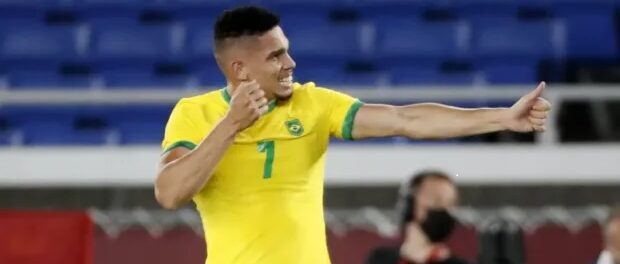
Brazil’s fifth gold medal in the Tokyo Olympics was secured by Isaquias Queiros, a black canoeist from Ubaitaba in Bahia (Ubaitaba in indigenous Tupi means Land of Canoes). Isaquias has become Brazil’s third most victorious medalist in the history of the Olympic Games. Minutes after Isaquias’ victory, the first black transvestite state co-deputy in Brazil’s state of Pernambuco, Robeyoncé Lima, posted:
Isaquias Queiroz, nordestino e negro, traz a quinta medalha de ouro nas olimpíadas para o Brasil!!!
Até agora a maioria de medalhas de ouro do Brasil foram de nordestinos, negros e mulheres!!
Podem tentar no parar, mas a gente que move esse país!
— Robeyoncé Lima (@RobeyonceLima) August 7, 2021
Northeastern and black, Isaquias Queiroz wins the fifth gold medal for Brazil in the Olympics!!!
Until now, the majority of Brazil’s gold medals have been won by people from the Northeast, black people, and women!!
They can try and stop us, but we’re the ones who move this country!
In the early hours of Saturday, August 7, Brazil’s sixth gold medal was won in boxing by Bahia native Hebert Conceição, who celebrated by saying: “Noble Warrior.” The expression is taken from the song Madiba, which Olodum sang for Mandela’s freedom. Conceição had already sung an extract from the song after the previous fight which led him to the final of the Tokyo Olympics: “Noble black warrior with a light soul, noble black warrior and fighter, let the good winds carry you calmly wherever you go….”
His singing made a buzz on social media. When he sang the song on August 1, Kaique Dalapola, community correspondent of the Mural Agency of Peripheral Journalism, posted online:
“Nobre guerreiro negro se alma leve
nobre guerreiro negro lutador
que os bons ventos calmo assim te leve
aonde você”De Salvador a milhão em Tóquio.
Hebert Conceição está na semifinal do boxe e já garantiu, no mínimo, a medalha de bronze para o Brasil!!! Vamo!! pic.twitter.com/fqiemlNcID
— Kaique Dalapola (@KaiqueDalapola) August 1, 2021
“Noble black warrior with a light soul, noble black warrior and fighter, let the good winds carry you calmly wherever you go.”
From Salvador to a million in Tokyo
Hebert Conceição is in the boxing semi-final and has already guaranteed, at the very least, the bronze medal for Brazil!!! Let’s do this!!
On August 7, the winds carried the “noble black warrior and fighter,” Conceição, to the highest point on the Olympic podium. University of Brasília doctoral candidate in Political Sciences Luiza Carvalho celebrated on Twitter:
Jovem Negro Vivo e Campeão Olímpico, medalha de Ouro em Tókio!!! Hebert é o nome!!!!
— luiza (@carvalholuizaa) August 7, 2021
A Young Black Man Alive and Olympic Champion, gold medal in Tokyo!!! Hebert is the one!!!!
About the author: Black journalist Rafael Lopes has a master’s in Communication from the Federal University of Rio de Janeiro (UFRJ). He researches the work of journalist and writer Lima Barreto.
About the artist: An undergraduate at the Federal University of Rio de Janeiro’s (UFRJ) School of Fine Arts, Raquel Batista, 19, was born and raised in Campo Grande and currently lives in Engenho de Dentro, in Rio’s North Zone. A visual artist who works as a photographer and illustrator, her goal is to use art to represent people who, like her, a young black woman from the periphery, are not always seen.
This article is the latest contribution to our year-long reporting project, “Rooting Anti-Racism in the Favelas: Deconstructing Social Narratives About Racism in Rio de Janeiro.” Follow our Rooting Anti-Racism in the Favelas series here.

